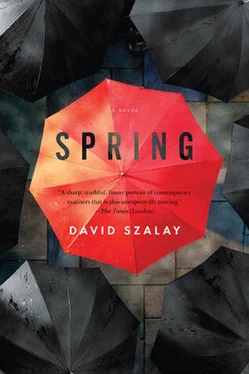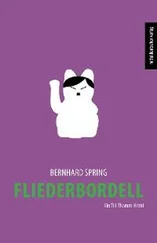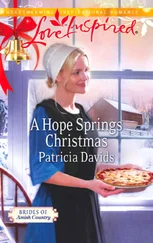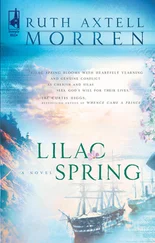Summer was out. The stripped wood floor of the hall was littered with shoes. Tipsily searching the fridge, she wondered—Jonathan still vaguely in her mind—whether she had just expected too much. Was she just mistaken to have supposed that she had to be sure ? That only sure would do? Had she thrown away a perfectly nice and happy life—white-stuccoed nook etc. — for that mistaken idea? And if so, how had she found herself possessed of such an idea? Well, that was obvious, she thought, eating a slice of Parma ham. It was everywhere. It was one of the most pervasive ideas of the society in which she lived, one of its main articles of faith, one of the most obsessively visited subjects of its art. We just wouldn’t leave off it.
Putting on her pyjamas, she worried that she was too used to living on her own, too self-sufficient, too used to not sharing—not sharing her time, in particular. She wondered whether she should have spent the evening with James, whether she owed it to him to have done that. He wanted her to. His horse had won. She had said she had other plans, a ‘prior engagement,’ which was true. She washed her face. She tied up her hair. She made sure her phone was on the night-table. Then, instead of the poetry anthology, she took down from the shelf where it had stood untouched for years the New Testament and found 1 Corinthians 13.
On Friday lunchtime James is standing under a ledge, eating a damp, overpriced pasty with frozen hands. The small lumps of stringy steak in the pasty scald his throat on the way down. The pastry is soft and wet. He throws the floury nub into an overflowing bin, and joins the queue at a stall selling extortionate noggins of steaming whisky. He is at Cheltenham for the last day of the Festival—a long-planned excursion. Freddy is there too, visiting the malodorous piss-slick of the overwhelmed Gents.
Pretty much everyone on the eight o’clock National Express service from Victoria was holding a soggy Racing Post. The coach took its time leaving London, and then stood at Heathrow for half an hour in the faint stink of aviation fuel. When it finally set off again and started down the M4, it was in a miserable drizzle. Towards the middle of the morning, Swindon came and went, unseen in the flurrying Scotch mist. Not long thereafter, they left the motorway, and for a while the coach swung promisingly through hedgy lanes. Then, somewhere near Cirencester, it was suddenly snarled in traffic. An hour later, it was still stuck on the outskirts of Cheltenham, in a world of dowdy Wisteria Drives, and Freddy phoned to say they would be late. They were supposed to be meeting some friends of his there—or at least one of them is a friend of his—or at least he is a ‘friend’ of his. Freddy knows Forrest from the Phene Arms, his local in Chelsea, where he and the young American often drink together on those Sunday afternoons, perhaps half of them, when Forrest isn’t in the office. Forrest and the other members of his party were having lunch in the Panoramic Restaurant when Freddy phoned a second time to say that he and James were there.
Since James and Freddy were not allowed anywhere near the Panoramic Restaurant, which was on the top floor of the newest segment of the stand, Forrest took the lift down and met them at the entrance. They looked pretty miserable, he thought. Weary and wet from the long walk to the track—taxis were not to be had for love nor money—Freddy was sporting a wilted fedora and sucking on a cigarette which he held with two fingers of a worryingly mauve hand.
‘Hi,’ Forrest said, lighting one of his own on the dripping threshold. He himself was stuffed into a green tweed three-piece purchased specially for the occasion. ‘You get here okay?’
‘Fine,’ Freddy lied. ‘You?’
‘Well, you know.’ Forrest seemed slightly embarrassed. ‘We were airlifted in.’ (And they were not the only ones—the air was full of the self-important mutter of helicopters, so many of them that they formed holding patterns over the lost summit of Cleeve Hill while they waited to land.) ‘Tristan’s idea,’ Forrest said. ‘He and Trevor paid for most of it. So… you know… it was kinda…’ He seemed to search for the word. ‘Neat, or something.’
‘Sure,’ Freddy said. He did not seem surprised. He did not seem impressed. Surprised and impressed were things that Freddy never seemed.
‘We’re just having lunch,’ Forrest said. ‘You had something to eat yet?’
‘No, not yet.’
‘Why don’t you get something to eat,’ Forrest suggested, ‘and we’ll meet you later?’
So while they headed for the enclave of steaming food vans near the main entrance, Forrest took the lift up to the fifth floor, where from the table in the warmth of the Panoramic Restaurant the track was a green jumble through the plate glass.
Looking out and down, Tristan watched the people putting up with the weather in front of the stands, and in the economy enclosures on the other side of the track. He was always struck by the social diversity of this event. There was nothing else quite like it. Drunken yobbos of all kinds—from the primordially working class to the most egregiously toffee-nosed, with large numbers from the swollen middle of society, from London and the south-east. There were soft-voiced older men and women from garden suburbs in sensible fleeces. There were farmers and their families. Peers. The Irish… In Tristan’s view it was the horses themselves who made it this way. They were not part of the human situation—their appeal was universal. The waitress was serving the starter. Smoked salmon. What a yawn. Typical of a place like this, he thought. Playing totally safe. He smiled easily at the waitress as she served him. ‘What do you like in the first, Trevor?’ he said.
The Head of Structured Products and Securitisation was squeezing lemon onto the thick slice of salmon on his plate. He put it down and wiped his fingers on a napkin. ‘Mister Hight,’ he said, in his unhurried, thinking-man’s Estuary English.
‘Yeah?’
‘Irish raider,’ Trevor said. ‘Should be too good for our lot.’ He said something about a juvenile hurdle he had seen at Naas in January. Trevor’s first visit to Prestbury Park was in 1973, when as an eighteen-year-old he hitch-hiked from London with a few quid in his pocket and won £100. One hundred pounds was a lot of money in 1973, for a tube driver’s son, and the win inspired him to start out as a professional punter. However, he soon worked out that the sums of money to be made from horse racing—even by a hard-working pro—were minuscule next to what was on offer in the financial markets, while the essential principle was the same: not winners, prices. He made the switch from track to trading room in 1980, working first for old Etonians (Tristan’s uncle was one of them), and then for a variety of foreigners.
‘The best of ours is probably Hobbs’s horse,’ he is saying. ‘Detroit City…’ He puts the stress on the first syllable— Dee -troit.
‘Detroit City?’ interrupts Forrest.
Trevor ignores him. ‘… and he might win, but he’ll be fav, and at the prices it’s got to be the Mullins horse. For me anyway.’
‘Detroit City?’ Forrest says again.
Trevor just nods, has a sip of wine, pats his mouth with his napkin, and starts to eat.
‘Well, you guys know I’m from Michigan?’ Forrest says, smiling.
Without looking at him, Trevor says, ‘You should back Dee -troit City then, shouldn’t you.’
They finally meet—James and Freddy, and Forrest and his party—in the lead-up to the main event. They meet on the windswept apron in front of the stands, now a jostling sea of punters. Forrest makes the introductions—and stumbles embarrassingly when he finds he has forgotten James’s name. There is a momentary pause, and then, with what seem for a second to be literally supernatural social skills, Tristan smoothly supplies it. ‘James,’ he says with a warm smile, putting out his white trowel of a hand. ‘Tristan Elphinstone. Lovely to see you again.’
Читать дальше












